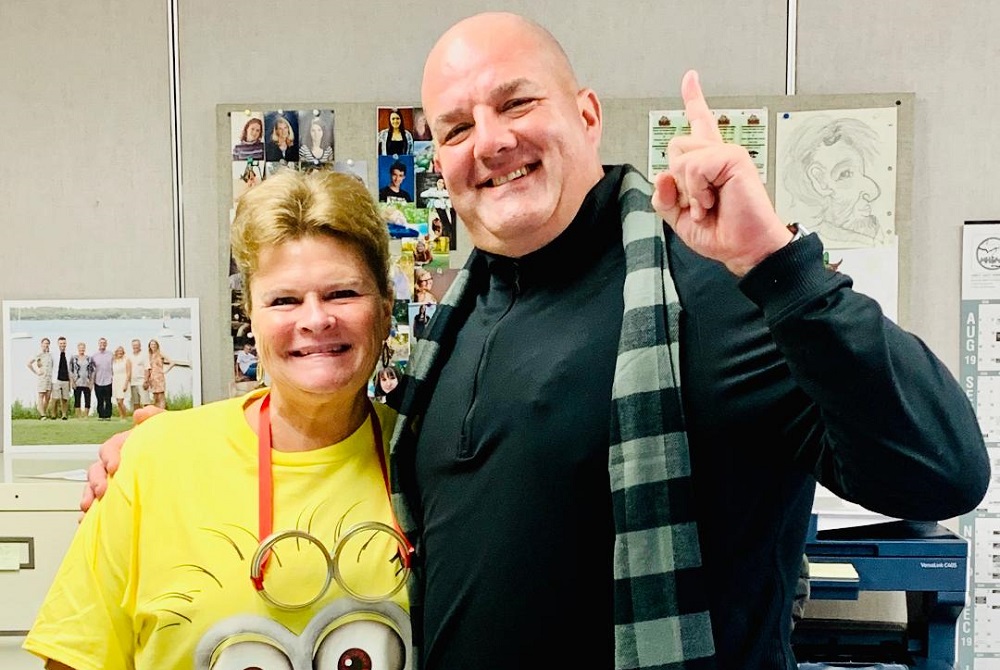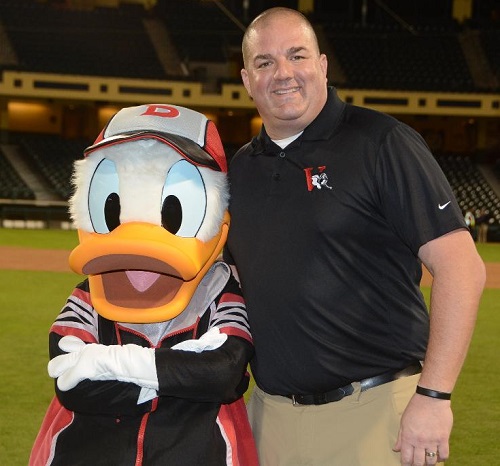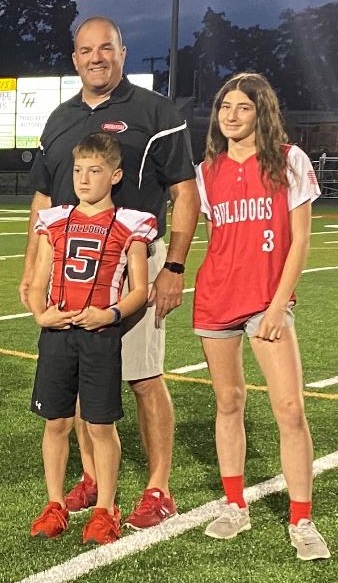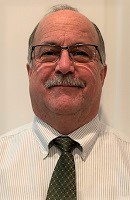
Singing the Praises of Unsung Heroes
July 2, 2013
By Rob Kaminski
MHSAA benchmarks editor
“Standing in the Shadows of Motown” is a documentary released in 2002 celebrating a group of musicians who called themselves the Funk Brothers.
Never heard of them?
All this unheralded group did was rack up more No. 1 hits than the Rolling Stones, Beatles, Beach Boys and Elvis – combined – during their unparalleled run as the musicians who drove the Motown sound.
Smokey Robinson, Diana Ross, Martha Reeves, Marvin Gaye, et al, took the bows; but it was this group of selfless, tireless, talented artists which thrust the vocalists to the front of the stage.
How quickly we recognize those songs from the first notes of that signature bass; the vibrant siren of horns, and rhythmic snapping of fingers before a single lyric is introduced.
And now, ladies and gentlemen, without further ado, we introduce to you the Funk Brothers (and Sisters) of school sports: the athletic administrators.
The profession calls for selfless, tireless, talented individuals who trumpet the efforts of students, orchestrate harmony among coaches and parents, and set the stage for local, affordable entertainment within their communities.
In Michigan, the group assumes this responsibility with unwavering ambition and enthusiasm, setting a solid foundation for the futures of roughly 300,000 athletic participants annually.
As MHSAA Executive Director Jack Roberts notes, “They don’t try to be the stars of the show, but they are indispensable for letting the stars shine – the student-athletes and their coaches.”
It is a role they cherish, taking nearly as much pride in their school family as their own. It’s both a byproduct and a prerequisite for such a job that commands long hours and a knack for interaction with a wide array of personalities and age groups.
Mostly, it’s the young people who make it all worthwhile. They are, after all, the reason the job exists.
“Just watching so many students grow up from immature kids to young adults who now are very successful, and how they appreciate all the extra time you spent with them is rewarding,” said Marc Sonnenfeld, the district athletic director and dean of discipline at Warren Fitzgerald.
“And most important is the, ‘Thank You,’ you get five or 10 years later for pushing them and teaching them life lessons they will never forget.”
In a position largely devoid of gratitude, it’s little wonder that the smallest displays mean the most.
“Having a coach thank me for supporting them, and watching student growth through athletics mean a lot to me,” said Eve Claar, in her fourth year as athletic director and assistant principal at Ann Arbor Pioneer High School.
Brian Gordon, less than a year into his post as director of athletics and physical education for Novi High School/Middle School after 22 years as a coach and teacher in Royal Oak, also enjoys the impromptu reunions.
“One of the things I most enjoyed was having kids come back to the programs either as a coach, parent, or simply as a fan,” Gordon said. “Nothing is better than when I would look behind the backstop and see some former players watching and laughing while listening to me say the same things I had said 10 years earlier.”
Lessons learned along the way
The typical path taken to the administrative office usually includes a stop or two in the coaching realm, which assists in the transition to life outside the playing boundaries.
“The experiences you bring from coaching are a huge help. I made plenty of mistakes as a coach that I see my own coaches make to this day,” said Chris Ervin, in his seventh year as the activities director at St. Johns High School. “You make mistakes, learn from them, and then make sure not to make them again.
“My philosophy – although not realistic, but certainly something to strive for – is this: we would have much better coaches if these three prerequisites were in place. 1) Coaches must be a parent first; 2) must be an official, and 3) must be an athletic director. If coaches had to have these three experiences before being allowed to coach, they would have a whole new perspective when working with students, parents and officials.”
Having been coaches first, however, lends an appreciation to the task of working with students on a daily basis and an understanding as to how an athletic director can best assist his or her coaches.
“Being a coach helped me to learn time management, and I became better at making relationships. In my job now, it helps me to look at things from the coaches’ viewpoints,” said Christian Wilson, the athletic director and assistant principal at Gaylord High School for 11 years. “As a coach, you have an immediate impact on students; administration involves more interaction with adults.”
A coaching background also can cause an athletic director to re-examine his or her days as a coach, and how they might have had a greater awareness for a former administrator’s tasks.
”The learning curve as the athletic director is massive,” said Gordon. “The job itself is huge. As a coach, you just worry about your own sport. As athletic director, I have more than 70 teams to tend to and over 100 coaches to worry about. Coaching and teaching only scratch the surface of what happens in any athletic office every day, but doing that for more than 20 years has helped the transition significantly.”
It is a viewpoint shared by Ken Mohney, a 14-year director of student activities for both the high school and middle school at Mattawan Consolidated Schools.
“Athletic administration opens up the big picture of the department and school mission. Instead of only focusing on the sport that one coaches, administrators must coordinate a program so that all sports collectively enhance the academic success of the entire school,” said Mohney, who also coached three sports at Mattawan for eight years prior to assuming his current duties. “I miss the connection to players and students that I had as a teacher and coach, as it is much more difficult to create and maintain positive relationships with kids in an administrative role.”
The majority of administrators who have had experience coaching admit to missing the close interaction with students and the opportunity to watch them develop into successful adults.
But, in some respects, the number of lives one can reach as an administrator is multiplied, and the scrapbook moments just take on slightly different poses.
Mike Thayer, athletic director and assistant principal for the past six years at Bay City Western High School following a decade at Merrill, recounts one of his proudest days in the business.
“In 1999, Merrill Community Schools had two MHSAA Scholar-Athletes Award winners,” Thayer said. “The senior class that year had approximately 80 students; yet, they produced two winners of this prestigious award. I miss the student interaction and school pride associated with team-building in coaching, but I do not miss the travel.”
Many duties call
Some ADs, however, might rather board the buses than schedule them, another of the many duties carried out on a weekly basis. In some cases, the position is responsible for school-wide transportation, not just athletic transportation.
Where once being the AD meant just that, the title for many in the profession today also includes a “/” before or after the words “athletic director.” It’s a trend which threatens the growth and quality of athletics in the educational mission of schools.
Even in schools where athletics are well entrenched and participation numbers soar, the people leading the charge are being asked to do more with less, often taking on responsibilities once doled out to two, and even three, individuals.
“Some of the larger challenges for me include the budget, balancing a very large work load, and just having enough time to evaluate coaches and programs effectively,” said Claar, who estimates that 60 percent of Pioneer’s 1,893 students participate in at least one sport.
Figuring conservatively, that’s more than 1,000 students deserving of her utmost attention in their extracurricular pursuits. But Claar also is assistant principal to the entire student body.
“Given the additional responsibilities, ADs are often spread too thin,” she said. “The time constraints make it difficult to complete all of the assigned tasks.”
Sonnenfeld, like so many others, attempts to split the time down the middle, but it rarely works out that way by the time he’s also done monitoring the cafeteria during lunch for a couple periods most days.
“I see between 35-60 kids every morning for various discipline issue,” said Sonnenfeld of one portion of his title. “I usually get to athletics by 1:00. I do as much as I can in the time that I have and then stay late on game days and catch up. And in my free time I’m responsible for renting out the athletic facilities. I make myself leave at a normal time on non-event days so that my family sees me.”
Additionally, he oversees the middle school athletic program, and feels guilty that he can’t devote more time to that level. He needn’t feel that way. If it weren’t for Sonnenfeld, the middle school would not have athletics at all.
“The middle school suffers because I cannot get down there to watch over stuff, but this is better than not having any middle school sports at all. They canceled them for a year, and got rid of the middle school athletic coordinator position and put the duties on me,” he said.
Sonnenfeld is not alone. Duties seem similar across the board.
“I am also responsible for coordinating all building facility usage, fundraising and transportation as well as lunch/hallway supervision before, during and after school,” Mohney said. “Athletic administration alone for grades 6-12 in a Class A school is a full-time, 14-hour-a-day job. It is extremely difficult.”
While not included in his title of activities director, Ervin, too, is expected to mete out discipline and supervise lunches on a regular basis.
“Time is a major obstacle,” Ervin said. “When our assistant principal is out of the building I take on most of the discipline in his absence, which leads to days where athletics and activities get zero attention.”
Rewarding pursuit
While frustrations can mount, the leaders of school sports programs also tend to be tough self-critics. Somewhere along the line, these folks noticed sacrifices being made by people like them while they were the same age as today’s students. They now carry those lessons forward.
“I had a very positive experience as a three-sport athlete in high school. My coaches all motivated me toward excellence while providing positive lessons and guidance,” said Mohney. “After graduation and upon returning to Michigan after four years of active military duty, my high school football coach offered me a JV football coaching position and strongly suggested that I may have what it takes to be a good teacher and coach. That guidance inspired me.”
Ditto for Gordon.
“When I hired into Royal Oak, there were several people who impacted me as a professional,” Gordon said. “Chuck Jones was our district AD, and he along with Frank Clouser (varsity baseball coach) really made a difference in where I am today. Chuck was always the constant professional who is arguably the most organized and efficient man I have ever met. Frank is the best coach I have ever been around. I have never met a coach who would break down skills and have the unique ability to teach every facet of the game.”
Creating similar moments for countless student-athletes in their hallways is the ultimate goal for today’s athletic directors. Being told they’ve done just that is enough to make all the cafeteria supervision worthwhile.
“The most rewarding part of athletics is when I observe a student who has come from a tough home environment, and through his or her involvement in athletics, they shine,” said Ervin.
“I always love it when graduated student-athletes come back to visit the school,” Mohney said, “so I can meet their children and hear of their successes in life.”
PHOTO: Greenville athletic director Brian Zdanowski points out features of the home lockerroom at Legacy Field, which opened for his school's football teams last fall.

Vicksburg AD Roy Honored Nationally for Service to School Sports
By
Pam Shebest
Special for MHSAA.com
February 15, 2022
VICKSBURG — Accepting an award on a national stage is an impressive feat for any athletic director.
 But it was even more special for Vicksburg AD Mike Roy, who shared that stage with his mentor and good buddy.
But it was even more special for Vicksburg AD Mike Roy, who shared that stage with his mentor and good buddy.
While Roy was presented a Distinguished Service Award from the National Interscholastic Athletic Administrators Association in December, retired AD Mike Garvey was inducted into its Hall of Fame.
“This award from the NIAAA was exceptionally special to me because Mike got inducted the very same night into the NIAAA Hall of Fame,” Roy said.
“To be able to receive that award with someone who means so much to me and has guided me and been so influential in my career was the icing on the top, the cherry.”
Garvey said to be mentioned as Roy’s mentor “is an amazing compliment. When the Hall of Fame asked me to send some photos, I had to have him in one.”
The two men first connected 23 years ago when Garvey left Lawton High School for the AD’s job in Delton. Roy filled the Lawton position.
“Mike took me under his wing,” Roy said. “He introduced me to another great friend, Fred Smith.
“Just a couple guys who are awesome gentlemen who are recognized throughout the country.”
Garvey reflects that admiration.
“Mike Roy has been recognized in Michigan and it’s time the rest of the country knows how great he is.” Garvey said.
“It was wonderful to share the stage with him. He’s a high-energy person who attacks everything with vigor. He gets things done.”
Two years ago, Roy received the MHSAA’s Allen W. Bush for service, prompting a Roy-like comment.
“With my joking, sarcastic system, I said to myself, ‘I must be getting old because I’m starting to get these awards and being recognized for it,’” he said.
“But, really, upon hearing it, you just sit back and are really taken aback and humbled by it.”
Rooted in Paw Paw
Roy started his athletic career in Paw Paw with football, basketball, baseball and track in high school.
After turning down offers from Division III schools, Roy accepted a football scholarship to University of Nevada, Las Vegas, which was an eye-opener.
“I found out very quickly when I got to UNLV to play football that I was no longer the big fish in the pond,” he said. “I was a very small fish in a very big pond.
“Going to UNLV forced me to grow up. Sometimes when reality smacks you in the face, it kind of wakes you up.”
That experience helps him guide high school athletes today.
 “Looking back now, there are some things I wish I had done on the academic side of it,” he said. “I wasn’t a great student; I wasn’t a terrible student. I wish I had done better.
“Looking back now, there are some things I wish I had done on the academic side of it,” he said. “I wasn’t a great student; I wasn’t a terrible student. I wish I had done better.
“My career goal at that time, wishful as it was, was to be an NFL player.”
At UNLV, Roy earned a bachelor’s degree in physical education and health with an endorsement in driver’s education and a master’s in instructional and curricular studies.
Once back in Michigan, Roy coached golf and strength and conditioning at Kalamazoo Valley Community College, taught strength classes at Western Michigan University and was an assistant to Kalamazoo College men’s basketball coach Joe Hacklin.
Roy applied for a job at Vicksburg High School — which he did not get.
Instead, he was hired to replace Garvey at Lawton, also teaching strength and conditioning, and coaching varsity basketball.
Three years later, Roy became AD at Vicksburg, a job he has had for the last 20 years.
Accolades began piling up, including the certified master athletic administrator designation from the NIAAA in 2005, Michigan Interscholastic Athletic Administrator Association (MIAAA) Athletic Director of the Year in 2012, MIAAA president in 2019-20, NIAAA delegate at the National Federation of State High School Associations (NFHS) national conference for 10 years and being named a finalist for National Athletic Director of the Year from the National High School Coaches Association.
At the NHSCA ceremony, Roy said he noticed one of the other finalists.
“One of the guys, when I looked, I said ‘Oh my gosh. He’s been an AD for 45 years.’
“Here I’m sitting with not even half that under my belt, wondering if I’m going to get 45 years in.”
Ever humble, Roy makes a point several times of mentioning that any award he receives is a culmination of efforts from a great support staff.
“I tell people in my joking way, ‘It’s my ugly face that gets the award, but when people come to Vicksburg they meet my ticket-taker or see my game management is on point,” he said.
“I wouldn’t be able to get half this stuff if I didn’t have the athletic secretary (Rhonda VanderKamp) I have. She’s phenomenal.”
VanderKamp, who has worked with Roy all 20 years, said they work well together.
As for sharing in any awards, “I’m honored but truly he deserves those awards,” she said. “We just complement each other.
“I’m so honored when I attend some of the conferences and they go around the room and ask you how many years you’ve been an athletic secretary and how many ADs have you been through. I can say only just one. It’s awesome.”
Showing off a great home
Under Roy, Vicksburg has hosted more than 100 MHSAA postseason events, and he takes pride in the workers and facilities.
“I’ve always been big on the appearance of our facilities,” he said. “Unfortunately, the outside community doesn’t get to see our library. They don’t get to see our science labs and all the other wonderful things we have going on in the building.
“When they come to Vicksburg, they’re drawing their assumptions on how they’re treated when they walk through the gate, how do the facilities look, are the trash cans overflowing, are things broken.”
He said when the MHSAA asks or looks for people to step up and host tournaments, “We have always been willing to do that. I ask our people and they say yes, we want to bring people to Vicksburg and show off our facilities.”
 Roy also implements ideas he hears at various conferences.
Roy also implements ideas he hears at various conferences.
“I always try to network and find out who’s doing something better than I’m doing and borrow that,” he said. “The neat thing about athletic directors in our association is we’re willing to share everything.
“We’re different than coaches who have a secret play or a playbook and don’t want anybody to know those plays.”
He noted that not everyone is cut out to be an athletic director.
“Most think all I do is sit around and eat popcorn, a hot dog and watch contests and how cool that is,” he said, laughing.
He said they do not see the contact with officials and support staff, refilling of concession supplies, setting up transportation to away games, notifying parents of any changes or problems and working on game schedules for next year.
As for non-AD duties, Roy spends time with his two children: Harper, a 5-foot-8 seventh grader whom he coaches on a 12-and-under softball team; and Ryker, a fourth grader involved in football, basketball, wrestling and baseball.
Doing things the right way
Roy said former Gull Lake AD Mike Foster helped craft his philosophy that high school sports are more than just winning.
“To me, in high school educational athletics, we’re here to grow the whole child and just not teach him how to win,” he said.
“I’m hiring my coaches who are going to be the best role models for my kids. We do want to win, because it’s important, but it’s not the ultimate goal for me.”
Speaking of coaches, Roy noted that his mentor is now an employee.
“Funny thing,” he said. “Mike Garvey’s my golf coach here. I always try to surround myself with some talented individuals.”
Garvey said Roy is the only reason he agreed to coach the boys golf team, and he would not consider doing it for anyone else.
“With his coaches, they’re a family and he’s like the patriarch who shows a lot of love and respect,” Garvey said.
***
 Garvey was one of 10 inductees making up the 13th class of the NIAAA Hall of Fame honored in December. Garvey served as an athletic administrator for 24 years through 2018 with stops at Lawton, Delton Kellogg, Otsego and Kalamazoo Hackett Catholic Prep. He received the MHSAA’s Allen W. Bush Award in 2015 and Charles E. Forsythe Award in 2020. He also was an assistant coach on two MHSAA Finals wrestling championship teams and as head coach led Lawton to the Class D title in 1990.
Garvey was one of 10 inductees making up the 13th class of the NIAAA Hall of Fame honored in December. Garvey served as an athletic administrator for 24 years through 2018 with stops at Lawton, Delton Kellogg, Otsego and Kalamazoo Hackett Catholic Prep. He received the MHSAA’s Allen W. Bush Award in 2015 and Charles E. Forsythe Award in 2020. He also was an assistant coach on two MHSAA Finals wrestling championship teams and as head coach led Lawton to the Class D title in 1990.
Garvey has been an active member of both the MIAAA and NIAAA and the Michigan Wrestling Coaches Association, and a member of the faculty for the NIAAA’s Leadership Training Institute while also serving as Michigan’s coordinator for the program. In retirement, he has continued to contribute to school sports in a variety of other ways as well including as a meet manager of the MHSAA’s Team Wrestling Finals at Wings Event Center in Kalamazoo.
Among additional accolades at the state and national levels, Garvey received the NIAAA’s 2016 Distinguished Service Award and the George Lovich State Award of Merit in 2009 from the MIAAA.
 Pam Shebest served as a sportswriter at the Kalamazoo Gazette from 1985-2009 after 11 years part-time with the Gazette while teaching French and English at White Pigeon High School. She can be reached at [email protected] with story ideas for Calhoun, Kalamazoo and Van Buren counties.
Pam Shebest served as a sportswriter at the Kalamazoo Gazette from 1985-2009 after 11 years part-time with the Gazette while teaching French and English at White Pigeon High School. She can be reached at [email protected] with story ideas for Calhoun, Kalamazoo and Van Buren counties.
PHOTOS (Top) Vicksburg athletic director Mike Roy gives much credit to his secretary Rhonda VanderKamp, his assistant during the entirety of his two decades at the school. (Middle) Roy takes a minute to take a photo with Donald Duck during a conference in Orlando, Fla. (Below) Roy and his children Harper and Ryker await the presentation of his MHSAA’s Allen W. Bush Award. (Photos courtesy of Mike Roy.)

